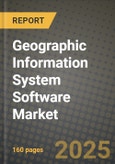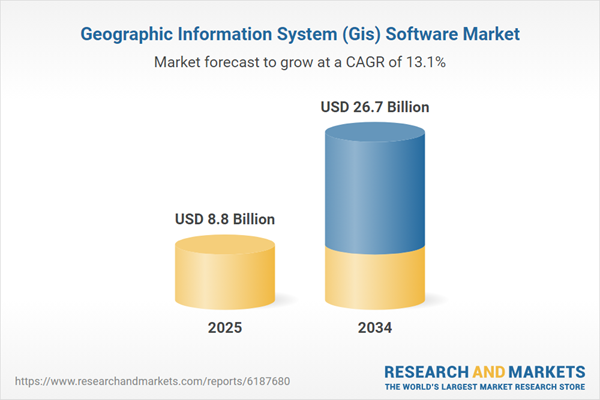The Geographic Information System (GIS) software market is expanding rapidly as organizations across industries leverage spatial data for decision-making, planning, and analysis. GIS software enables users to visualize, manage, and interpret geographical data to uncover patterns, relationships, and trends. From urban planning and environmental management to defense and logistics, the applications of GIS are growing exponentially. Technological advancements, including artificial intelligence (AI) integration, cloud-based GIS solutions, and real-time data processing, are enhancing the accuracy and usability of GIS software. Governments, businesses, and research institutions are increasingly adopting GIS to improve resource allocation, infrastructure development, and emergency response planning. With the increasing demand for geospatial intelligence and advancements in data visualization, the GIS software market is set to witness sustained growth in the coming years.
The GIS software market saw significant advancements, driven by the integration of AI and machine learning capabilities for enhanced spatial analytics. The adoption of cloud-based GIS solutions surged, enabling seamless data access and collaboration across multiple users and locations. Governments and enterprises increasingly utilized GIS for smart city initiatives, environmental monitoring, and disaster response planning. Additionally, real-time GIS applications gained traction, particularly in logistics, agriculture, and utilities, where dynamic spatial data enhanced operational efficiency. The rise of location intelligence in business analytics further fueled demand, with retail and financial sectors leveraging GIS for customer insights and market expansion strategies. Open-source GIS platforms also gained prominence, offering cost-effective alternatives and fostering innovation. The increasing reliance on GIS software across industries positioned 2024 as a transformative year for geospatial technology.
The GIS software market is expected to witness deeper integration with emerging technologies such as 5G, Internet of Things (IoT), and blockchain for enhanced data security and connectivity. AI-powered GIS analytics will continue to evolve, enabling predictive modeling and real-time simulations for critical applications like climate change monitoring and urban planning. The expansion of digital twins - virtual replicas of physical environments - will further drive GIS adoption in infrastructure management and smart city development. Additionally, increased investments in GIS education and training programs will bridge the skill gap, allowing organizations to maximize the potential of geospatial data. However, data privacy concerns and interoperability challenges among different GIS platforms will remain key hurdles. As industries increasingly rely on location intelligence for strategic decision-making, GIS software will play an even more integral role in shaping global markets.
Key Insights: Geographic Information System (Gis) Software Market
- AI-Driven Spatial Analytics: GIS software is incorporating artificial intelligence and machine learning to enhance predictive analysis, automate data processing, and improve decision-making accuracy.
- Growth of Cloud-Based GIS Solutions: The adoption of cloud-hosted GIS platforms is rising, enabling seamless data sharing, remote collaboration, and real-time geospatial analysis.
- Expansion of Real-Time GIS Applications: Industries such as logistics, transportation, and agriculture are increasingly utilizing real-time spatial data for enhanced operational efficiency and decision-making.
- Digital Twin Integration: The development of digital twins is driving GIS adoption in infrastructure management, urban planning, and industrial asset monitoring.
- Advancements in Open-Source GIS: Open-source GIS platforms are gaining traction, providing cost-effective solutions and encouraging innovation in geospatial data analysis.
- Rising Demand for Location Intelligence: Businesses and governments are increasingly relying on GIS for data-driven decision-making in sectors like retail, logistics, and urban planning.
- Government Initiatives for Smart Cities: Investments in smart city projects are driving GIS adoption for efficient infrastructure planning, traffic management, and resource allocation.
- Integration with IoT and 5G: The growing IoT ecosystem and advancements in 5G connectivity are enhancing real-time GIS applications and expanding use cases.
- Environmental and Disaster Management Needs: GIS plays a crucial role in climate change monitoring, disaster response, and resource conservation efforts, fueling market growth.
- Data Privacy and Security Concerns: The increasing volume of geospatial data raises challenges related to data security, privacy regulations, and unauthorized access, necessitating robust cybersecurity measures.
Geographic Information System (Gis) Software Market Segmentation
By Component
- Software
- Services
By Type
- Desktop GIS
- Server GIS
- Developer GIS
- Mobile GIS
- Other Types
By Function
- Mapping
- Surveying
- Location-Based Services
- Navigation and Telematics
- Other Functions
By Industry Vertical
- Automotive
- Energy and Utilities
- Government
- Defense and Intelligence
- Smart Cities
- Insurance
- Natural Resources
- Other Industry Verticals
Key Companies Analysed
- Google LLC
- Hitachi Solutions Ltd.
- General Electric Co.
- Oracle Corporation
- Fujitsu Limited
- Salesforce Inc.
- NEC Corporation
- Hexagon AB
- Autodesk Inc.
- Trimble Inc.
- Pitney Bowes Inc.
- Tyler Technologies Inc.
- Esri Global Inc.
- Bentley Systems Incorporated
- TomTom N.V.
- GB Group PLC
- SuperMap Software Co. Ltd.
- Safe Software Inc.
- CoreCompete LLC.
- Caliper Corporation
- QGIS
- CartoDB Inc.
- ThinkGeo LLC.
- Cadcorp Limited
- Golden Software LLC
- Blue Marble Group Inc.
- Terra Gis Ltd.
- MangoMap LIMITED
- PASCO Corporation
- Open Source Geospatial Foundation.
Geographic Information System (Gis) Software Market Analytics
The report employs rigorous tools, including Porter’s Five Forces, value chain mapping, and scenario-based modeling, to assess supply-demand dynamics. Cross-sector influences from parent, derived, and substitute markets are evaluated to identify risks and opportunities. Trade and pricing analytics provide an up-to-date view of international flows, including leading exporters, importers, and regional price trends.Macroeconomic indicators, policy frameworks such as carbon pricing and energy security strategies, and evolving consumer behavior are considered in forecasting scenarios. Recent deal flows, partnerships, and technology innovations are incorporated to assess their impact on future market performance.
Geographic Information System (Gis) Software Market Competitive Intelligence
The competitive landscape is mapped through proprietary frameworks, profiling leading companies with details on business models, product portfolios, financial performance, and strategic initiatives. Key developments such as mergers & acquisitions, technology collaborations, investment inflows, and regional expansions are analyzed for their competitive impact. The report also identifies emerging players and innovative startups contributing to market disruption.Regional insights highlight the most promising investment destinations, regulatory landscapes, and evolving partnerships across energy and industrial corridors.
Countries Covered
- North America - Geographic Information System (Gis) Software market data and outlook to 2034
- United States
- Canada
- Mexico
- Europe - Geographic Information System (Gis) Software market data and outlook to 2034
- Germany
- United Kingdom
- France
- Italy
- Spain
- BeNeLux
- Russia
- Sweden
- Asia-Pacific - Geographic Information System (Gis) Software market data and outlook to 2034
- China
- Japan
- India
- South Korea
- Australia
- Indonesia
- Malaysia
- Vietnam
- Middle East and Africa - Geographic Information System (Gis) Software market data and outlook to 2034
- Saudi Arabia
- South Africa
- Iran
- UAE
- Egypt
- South and Central America - Geographic Information System (Gis) Software market data and outlook to 2034
- Brazil
- Argentina
- Chile
- Peru
Research Methodology
This study combines primary inputs from industry experts across the Geographic Information System (Gis) Software value chain with secondary data from associations, government publications, trade databases, and company disclosures. Proprietary modeling techniques, including data triangulation, statistical correlation, and scenario planning, are applied to deliver reliable market sizing and forecasting.Key Questions Addressed
- What is the current and forecast market size of the Geographic Information System (Gis) Software industry at global, regional, and country levels?
- Which types, applications, and technologies present the highest growth potential?
- How are supply chains adapting to geopolitical and economic shocks?
- What role do policy frameworks, trade flows, and sustainability targets play in shaping demand?
- Who are the leading players, and how are their strategies evolving in the face of global uncertainty?
- Which regional “hotspots” and customer segments will outpace the market, and what go-to-market and partnership models best support entry and expansion?
- Where are the most investable opportunities - across technology roadmaps, sustainability-linked innovation, and M&A - and what is the best segment to invest over the next 3-5 years?
Your Key Takeaways from the Geographic Information System (Gis) Software Market Report
- Global Geographic Information System (Gis) Software market size and growth projections (CAGR), 2024-2034
- Impact of Russia-Ukraine, Israel-Palestine, and Hamas conflicts on Geographic Information System (Gis) Software trade, costs, and supply chains
- Geographic Information System (Gis) Software market size, share, and outlook across 5 regions and 27 countries, 2023-2034
- Geographic Information System (Gis) Software market size, CAGR, and market share of key products, applications, and end-user verticals, 2023-2034
- Short- and long-term Geographic Information System (Gis) Software market trends, drivers, restraints, and opportunities
- Porter’s Five Forces analysis, technological developments, and Geographic Information System (Gis) Software supply chain analysis
- Geographic Information System (Gis) Software trade analysis, Geographic Information System (Gis) Software market price analysis, and Geographic Information System (Gis) Software supply/demand dynamics
- Profiles of 5 leading companies - overview, key strategies, financials, and products
- Latest Geographic Information System (Gis) Software market news and developments
Additional Support
With the purchase of this report, you will receive:- An updated PDF report and an MS Excel data workbook containing all market tables and figures for easy analysis.
- 7-day post-sale analyst support for clarifications and in-scope supplementary data, ensuring the deliverable aligns precisely with your requirements.
- Complimentary report update to incorporate the latest available data and the impact of recent market developments.
This product will be delivered within 1-3 business days.
Table of Contents
Companies Mentioned
- Google LLC
- Hitachi Solutions Ltd.
- General Electric Co.
- Oracle Corporation
- Fujitsu Limited
- Salesforce Inc.
- NEC Corporation
- Hexagon AB
- Autodesk Inc.
- Trimble Inc.
- Pitney Bowes Inc.
- Tyler Technologies Inc.
- Esri Global Inc.
- Bentley Systems Incorporated
- TomTom N.V.
- GB Group PLC
- SuperMap Software Co. Ltd.
- Safe Software Inc.
- CoreCompete LLC.
- Caliper Corporation
- QGIS
- CartoDB Inc.
- ThinkGeo LLC.
- Cadcorp Limited
- Golden Software LLC
- Blue Marble Group Inc.
- Terra Gis Ltd.
- MangoMap LIMITED
- PASCO Corporation
- Open Source Geospatial Foundation.
Table Information
| Report Attribute | Details |
|---|---|
| No. of Pages | 160 |
| Published | October 2025 |
| Forecast Period | 2025 - 2034 |
| Estimated Market Value ( USD | $ 8.8 Billion |
| Forecasted Market Value ( USD | $ 26.7 Billion |
| Compound Annual Growth Rate | 13.1% |
| Regions Covered | Global |
| No. of Companies Mentioned | 30 |









